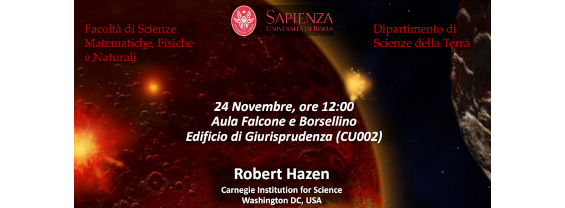Seminario tenuto dal Visiting Professor Robert Hazen, il 24 Novembre 2023, ore 12.00, dal titolo "Mineral Evolution: A Case Study of a New Natural Law", in Aula Falcone e Borsellino di Giurisprudenza (CU002)

Il 24 novembre 2023, alle ore 12.00, siete invitati a partecipare ad un seminario presso la Sapienza Università di Roma, presentato da Robert Hazen, dal titolo "Mineral Evolution: A Case Study of a New Natural Law", presso l'Aula Falcone e Borsellino di Giurisprudenza (CU002).
Ci auguriamo che possiate partecipare a questo evento, che si svolge poco dopo la pubblicazione di due importanti articoli di Hazen e del suo gruppo di ricerca sulla rivista PNAS. Questi articoli hanno già ottenuto una grande attenzione da parte della comunità scientifica e del pubblico in generale attraverso i media come la TV, la radio, le riviste e i giornali.
Abstract: The diversity and distribution of Earth's minerals have changed through 4.5 billion years as a consequence of varied physical, chemical, and ultimately biological processes. "Mineral evolution," the study of this rich history of change, has led to a new mineral classification scheme that complements the official system of the International Mineralogical Association. The new "Evolutionary System" of mineralogy attempts to place every mineral species in its historical setting and formational environment. In this way, minerals provide one vivid example of a much more general natural process. Indeed, a pervasive wonder of the natural world is the evolution of varied systems, from stars to minerals to life. These evolving systems seem to be conceptually equivalent in that they display three notable attributes: (1) they form from numerous components that have the potential to adopt combinatorially vast numbers of different configurations; (2) processes exist that generate numerous different configurations; and (3) configurations are preferentially selected based on function. We identify universal concepts of selection—static persistence, dynamic persistence, and novelty generation—that underpin function and drive systems to evolve through the exchange of information between the environment and the system. Accordingly, we propose a new law, the “law of increasing functional information”: The functional information of a system will increase (i.e., the system will evolve) if many different configurations of the system undergo selection for one or more functions. Mineral evolution is a revealing test case of this law.
References
- Wong et al. (2023): On the roles of function and selection in evolving systems. Proc Natl Acad Sci, 120(43), e2310223120.
- Cleaves II et al. (2023): A robust, agnostic molecular biosignature based on machine learning. Proc Natl Acad Sci, 120(41), e2307149120.

